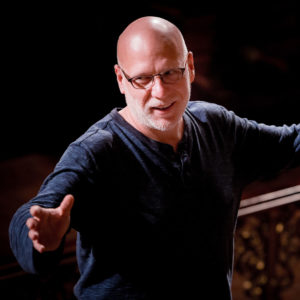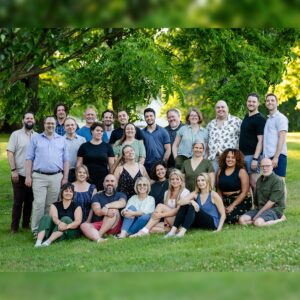Ways You Went
Martin Bresnick composer
Mason Bates composer
The Crossing | Donald Nally conductor
PRISM Quartet
Scott Dettra organ
Recently named Musical America’s 2024 Ensemble of the Year, Donald Nally’s chamber choir The Crossing stuns with their latest studio album, WAYS YOU WENT. Vibrant, exhilarating, and uplifting, this new release features original compositions by composers Martin Bresnick and Mason Bates.
WAYS YOU WENT is a yin and yang of interconnected opposites. Bresnick’s song cycle Self-Portraits 1964 exclusively deals with the life and personality of a single man: young and intellectual, working as a trash collector to put himself through college, and escaping into literature at night. Bates’ trilogy Mass Transmission takes a telegraph conversation between mother and daughter in the 1920s and sets it to music, contrasting the warmth of human communication and a mechanistic medium. Both of these cycles, one introspective, the other socially oriented, are snapshots of a time gone by. The Crossing brings both to life with perfect mastery.
Listen
Stream/Buy
Choose your platform
Track Listing & Credits
| # | Title | Composer | Performer | |
|---|---|---|---|---|
| 01 | Self-Portraits 1964, Unfinished: His Own Identity | Martin Bresnick | The Crossing | Donald Nally, conductor; PRISM Quartet | 2:10 |
| 02 | Self-Portraits 1964, Unfinished: I Wake | Martin Bresnick | The Crossing | Donald Nally, conductor; PRISM Quartet | 6:20 |
| 03 | Self-Portraits 1964, Unfinished: Where Lies The Final Harbor | Martin Bresnick | The Crossing | Donald Nally, conductor; PRISM Quartet | 5:39 |
| 04 | Self-Portraits 1964, Unfinished: The Darkling Thrush | Martin Bresnick | The Crossing | Donald Nally, conductor; PRISM Quartet | 10:58 |
| 05 | Self-Portraits 1964, Unfinished: Of Mortal Beauty | Martin Bresnick | The Crossing | Donald Nally, conductor; PRISM Quartet | 10:38 |
| 06 | Self-Portraits 1964, Unfinished: To Fling Out Broad Its Name | Martin Bresnick | The Crossing | Donald Nally, conductor; PRISM Quartet | 3:29 |
| 07 | Mass Transmission: The Dutch Telegraph Office | Mason Bates | The Crossing | Donald Nally, conductor; Scott Dettra, Organ | 10:22 |
| 08 | Mass Transmission: Java | Mason Bates | The Crossing | Donald Nally, conductor; Scott Dettra, Organ | 5:34 |
| 09 | Mass Transmission: Wireless Connections | Mason Bates | The Crossing | Donald Nally, conductor; Scott Dettra, Organ | 5:45 |
ACKNOWLEDGEMENTS
We are grateful for:
our artists, composers, audience, friends, and supporters; the staff and congregation at our home, The Presbyterian Church of Chestnut Hill; Heidi Kurtz and Beth van de Water for hospitality;
those who opened their homes to our artists during the recording of this album: David and Rebecca Thornburgh, Jeff and Liz Podraza, Corbin Abernathy and Andrew Beck, Dan Schwartz and Michael Rowley, Lauren Kelly and Henry Koch, Rebecca and Mark Bernstein, Steven Hyder and Donald Nally.
THE BOARD OF DIRECTORS OF THE CROSSING
Timothy V. Blair
Tyler Carrigan – Vice President
Phil Cooke – Treasurer
Mallory Dennis
Micah Dingler
Shawn Felton – Secretary
Mary D. Hangley
Cynthia A. Jarvis – President
Lauren Kelly
Mary Kinder Loiselle
Michael M. Meloy
Donald Nally – Conductor
Andrew Quint
Carol Loeb Shloss
Daniel Taylor
THE STAFF OF THE CROSSING
Donald Nally, conductor
Shannon McMahon, operations manager
Kevin Vondrak, assistant conductor & artistic associate
Paul Vazquez, sound designer
Elizabeth Dugan, bookkeeper
Benjamin Perri, production assistant – Mass Transmission
The Crossing is represented by Alliance Artist Management.
COME. HEAR. NOW.
www.crossingchoir.org
Self-Portraits 1964, Unfinished
Recorded March 21-23, 2023 at St. Peter’s Church in the Great Valley, Malvern PA
Mass Transmission
Recorded live in concert December 18, 2022 during The Crossing @ Christmas at The Crossing’s home, The Presbyterian Church of Chestnut Hill, Philadelphia PA
Recording Session Producers Paul Vazquez, Donald Nally and Kevin Vondrak
Project Keyboards John Grecia and Chuck Foster
Guest Keyboards John Conahan, Tim Lambert and John Walthausen
Recording Session Engineer Paul Vazquez
Assistant Recording Session Engineer Codi Yhap
Editing, Mixing, and Mastering Paul Vazquez
Album artwork by Christopher St. John
This album was made possible through the generous support
of Carol Westfall.
Executive Producer Bob Lord
VP of A&R Brandon MacNeil
VP of Production Jan Košulič
Audio Director Lucas Paquette
VP, Design & Marketing Brett Picknell
Art Director Ryan Harrison
Design Edward A. Fleming
Publicity Chelsea Kornago
Digital Marketing Manager Brett Iannucci
Artist Information

Donald Nally
Donald Nally collaborates with creative artists, leading orchestras, and art museums to make new works for choir that address social and environmental issues. He has commissioned nearly 200 works and, with his ensemble The Crossing (Musical America’s 2024 Ensemble of the Year), has produced 35 albums, winning three GRAMMY® Awards for Best Choral Performance, while nominated nine times.

The Crossing
The Crossing is a professional chamber choir conducted by Donald Nally, dedicated to performing new music and committed to addressing social, environmental, and political issues through nearly 180 commissioned premieres. Collaborating with prestigious ensembles and venues like the New York and Los Angeles Philharmonics, Park Avenue Armory, Lincoln Center, and Carnegie Hall, The Crossing has released 35 albums, earning three GRAMMY® Awards for Best Choral Performance and multiple nominations. The Crossing is Musical America's 2024 Ensemble of The Year.
Walter Aldrich MT
Isobel Anthony MT
Katy Avery SP MT
Nathaniel Barnett SP
Kelly Ann Bixby MT
Karen Blanchard SP MT
Steven Bradshaw SP MT
Aryssa Burrs * SP
Matthew Cramer MT
Micah Dingler MT
Ryan Fleming SP MT
Joanna Gates SP MT
Michael Hawes * SP
Steven Hyder SP MT
Michael Jones SP MT
Lauren Kelly SP MT
Anika Kildegaard SP MT
Heidi Kurtz MT
Elijah McCormack SP
Maren Montalbano SP MT
Rebecca Myers * SP
Daniel O’Dea MT
James Reese * SP
Daniel Schwartz SP MT
Thann Scoggin SP MT
Rebecca Siler ^ SP MT
Tiana Sorenson SP MT
Daniel Spratlan SP MT
Elisa Sutherland ^ MT
Daniel Taylor SP MT
Jackson Williams SP
Shari Wilson SP
* soloist, Self-Portraits 1964, Unfinished
^ soloist, Mass Transmission

